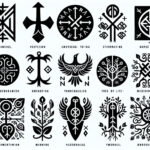The word ‘Pagan’ has been used in many different contexts throughout history, but what does it actually mean? In this article, we will explore the various definitions of the word ‘Pagan’ and discuss how it has been used in different eras and cultures. We will look at the history of Paganism, its beliefs and practices, as well as how it has been viewed in both modern and ancient societies. By the end of this article, you will have a better understanding of the term ‘Pagan’ and its various meanings.

Paganism is a term that is used to describe a variety of spiritual and religious beliefs and practices. It is typically used to refer to pre-Christian, indigenous religious beliefs and practices, but it can also be used to refer to any religion other than Christianity, Judaism, or Islam. Paganism is often associated with nature-based spiritual beliefs and practices, such as animism and shamanism, and the worship of multiple gods or goddesses.
What is Paganism?
Paganism is an umbrella term that encompasses a variety of spiritual and religious beliefs and practices. It is typically used to refer to pre-Christian, indigenous spiritual and religious beliefs and practices, but it can also be used to refer to any religion other than Christianity, Judaism, or Islam. Paganism is often associated with nature-based spiritual beliefs and practices, such as animism and shamanism, and the worship of multiple gods or goddesses.
Where Does the Term “Pagan” Come From?
The term “pagan” comes from the Latin word “paganus,” which means “country dweller” or “rustic.” It was used in the 4th century to refer to people who were not Christian, and by the 5th century it was used to refer to all non-Christians. The term “paganism” was first used in the early 19th century to refer to pre-Christian, nature-based spiritual beliefs and practices.
What Are the Beliefs and Practices of Paganism?
Paganism is an umbrella term that encompasses a variety of spiritual and religious beliefs and practices. It is typically used to refer to pre-Christian, indigenous spiritual and religious beliefs and practices, but it can also be used to refer to any religion other than Christianity, Judaism, or Islam.
Common beliefs and practices of paganism include:
- Animism: the belief that all objects, places, and creatures possess a distinct spiritual essence.
- Polytheism: the belief in and worship of multiple gods and goddesses.
- Shamanism: the practice of entering an altered state of consciousness to interact with the spirit world and gain spiritual knowledge.
- Nature worship: the practice of honoring and worshipping nature, its cycles, and its elements.
- Spiritual healing: the practice of using spiritual practices to heal the body, mind, and spirit.
- Magick: the belief that one can influence the world through rituals, spells, and other forms of energy work.
Paganism is an umbrella term that encompasses a variety of spiritual and religious beliefs and practices, and there is no single set of beliefs or practices that all pagans share.
Do Pagans Believe in a Deity?
Pagans may or may not believe in a deity or deities. Many pagans believe in multiple gods and goddesses, while others may believe in a single deity or none at all. Some pagans believe in a higher power or force without necessarily ascribing a gender or form to it.
Are There Any Sacred Texts or Practices in Paganism?
Paganism does not have any sacred texts or practices that are shared by all pagans. Each individual or group may have their own beliefs and practices, and some may use books or other written sources for inspiration.
What Is the Difference Between Paganism and Wicca?
Paganism is an umbrella term that encompasses a variety of spiritual and religious beliefs and practices, while Wicca is a specific religious tradition within the broader category of paganism. Wicca is a religious tradition that is based on the worship of nature and the belief in multiple gods and goddesses.
Are There Any Organizations or Groups Associated With Paganism?
Yes, there are a variety of organizations and groups associated with paganism. These range from small local groups to large international organizations, and they may focus on a particular faith tradition, such as Wicca, or they may be more broadly focused on paganism in general. Some examples of organizations and groups associated with paganism include the Covenant of the Goddess, the Church of All Worlds, and the Pagan Federation International.
Conclusion
Paganism is an umbrella term that encompasses a variety of spiritual and religious beliefs and practices. It is typically used to refer to pre-Christian, indigenous spiritual and religious beliefs and practices, but it can also be used to refer to any religion other than Christianity, Judaism, or Islam. Common beliefs and practices of paganism include animism, polytheism, shamanism, nature worship, spiritual healing, and magick. Pagans may or may not believe in a deity or deities, and there are no sacred texts or practices that are shared by all pagans. Wicca is a specific religious tradition within the broader category of paganism. There are a variety of organizations and groups associated with paganism that range from small local groups to large international organizations.

In conclusion, the term “pagan” is a broad umbrella term that describes a wide variety of spiritual and religious beliefs and practices. It is important to remember that paganism is not a monolithic belief system, but rather a diverse set of spiritual beliefs and practices that vary from culture to culture and from individual to individual. As such, it is important to recognize the many forms of paganism and to respect the variety of beliefs and practices that exist within the pagan community. Ultimately, paganism is a spiritual path that is based on respect for nature, for the divine, and for the individual.





